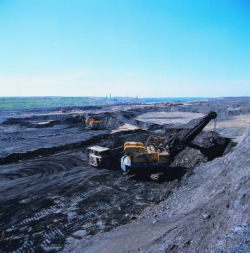
The Catholic bishop whose diocese extends over the tar sands has posted a scathing pastoral letter, “The Integrity of Creation and the Athabasca Oil Sands.”
The letter by Bishop Luc Bouchard concludes, “even great financial gain does not justify serious harm to the environment,” and “the present pace and scale of development in the Athabasca oil sands cannot be morally justified.” Equally powerful is who the letter is addressed to:
The critical points made in this letter are not directed to the working people of Fort McMurray but to oil company executives in Calgary and Houston, to government leaders in Edmonton and Ottawa, and to the general public whose excessive consumerist lifestyle drives the demand for oil.
We have met the enemy and he is us!
Other than sticking with the euphemism “oil sands” (see “Canada tries to tar-sandbag Obama on climate” the remarkably detailed and heavily footnoted letter is a brilliant piece of work dissecting what has been called the “biggest global warming crime ever seen.”
Bishop Bouchard notes that “The environmental liabilities that result from the various steps in this process are significant and include”:
- Destruction of the boreal forest eco-system
- Potential damage to the Athabasca water shed
- The release of greenhouse gases
- Heavy consumption of natural gas
- The creation of toxic tailings ponds
He writes at length on all five, and concludes
Any one of the above destructive effects provokes moral concern, but it is when the damaging effects are all added together that the moral legitimacy of oil sands production is challenged.
Here is what he says specifically about greenhouse gases:
Very large amounts of natural gas are required to heat water in order to process bitumen. By 2011, it is estimated that the then existing oil sands plants will burn enough natural gas to annually release 80 million tons of CO2 into the atmosphere. This is far more than all of the CO2 released annually by all of Canada’s passenger cars.
The oil sands plants will then account for 15% of all of Canada’s greenhouse gas emissions. At present, Alberta produces three times more per capita greenhouse gas emissions than the Canadian average and six times the West European average. The good news is that progress is being made in reducing the amount of greenhouse gas emissions per barrel and the concept of carbon sequestering (pumping CO2 into sealed underground caverns) offers some potential hope in the reduction of emissions. The bad news is that this reduction will not affect the total amount of emissions because new oil sands projects and expansions keep raising the total amount of emissions despite average per barrel reductions.
He further adds:
- Hedging on our national commitment to reduce greenhouse gases is damaging to Canada’s reputation and is damaging to the environment. Future oil sands developments must be paced so as to allow Canada to meet its international commitments.
- The enormous amounts of greenhouse gases created by the oil sands processing plants must be offset by national reductions.
Beyond those two, he has another eight “requirements before any further oil sands plants or leases are considered for approval,” but I don’t see how it’s possible for Canada to meet any plausible greenhouse gas targets if it continues to expand the tar sands.
The whole letter is worth reading. A good Canadian news story is here.
This post was created for ClimateProgress.org, a project of the Center for American Progress Action Fund.


